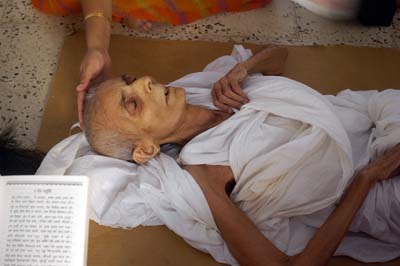The Supreme Court Monday August 31,2015stayed the operation of a Rajasthan High
Court order terming as illegal the religious practice of santhara, a
ritual of fasting until death prevalent among Jain community members.
"Issue notice. Leave granted," a bench comprising Chief Justice H L Dattu and Justice Amitava Roy said while staying the HC order and issuing notices to the Centre, Rajasthan and others.
The bench was hearing a batch of petitions filed by various religious bodies of Jain community members against the High Court order on santhara.
The pleas had sought a stay on the high court judgement, claiming it was passed without appreciating the basic philosophy and tenets of the Jain religion.
The Rajasthan High Court had on August 10 held 'santhara' as illegal making it punishable under section 306 and 309 of IPC related to abetment of suicide.
The petitions claimed that the high court erred in equating the religious practice with the offence of suicide.
The petition came in the backdrop of protests by the community in Rajasthan and some other states against the high court order
Note
This is an age old Custom in INDIA , known as "Santhara" , where a follower or devotee of the JAIN sect , gives up all food and water voluntarily , and wait for Death.This is not considered dying but taking a "Samadhi" , becoming one with the supreme being, the all mighty.
 Santhara is the Jain religious ritual of voluntary death by fasting. Supporters of the practice believe that Santhara cannot be considered suicide,
but rather something one does with full knowledge and intent, while
suicide is viewed as emotional and hasty. Due to the prolonged nature of
Santhara, the individual is given ample time to reflect on his or her life.
The vow of Santhara is taken when one feels that one's life has served
its purpose. The goal of Santhara is to purify the body and, with this,
the individual strives to abandon desire.
Santhara is the Jain religious ritual of voluntary death by fasting. Supporters of the practice believe that Santhara cannot be considered suicide,
but rather something one does with full knowledge and intent, while
suicide is viewed as emotional and hasty. Due to the prolonged nature of
Santhara, the individual is given ample time to reflect on his or her life.
The vow of Santhara is taken when one feels that one's life has served
its purpose. The goal of Santhara is to purify the body and, with this,
the individual strives to abandon desire.
During the last days the person is in the company of fellow devotees who sing hymns and prayers and religious texts in order that the transition from the "Earthly" to the "Heavenly" is joyous and peaceful .
"Issue notice. Leave granted," a bench comprising Chief Justice H L Dattu and Justice Amitava Roy said while staying the HC order and issuing notices to the Centre, Rajasthan and others.
The bench was hearing a batch of petitions filed by various religious bodies of Jain community members against the High Court order on santhara.
The pleas had sought a stay on the high court judgement, claiming it was passed without appreciating the basic philosophy and tenets of the Jain religion.
The Rajasthan High Court had on August 10 held 'santhara' as illegal making it punishable under section 306 and 309 of IPC related to abetment of suicide.
The petitions claimed that the high court erred in equating the religious practice with the offence of suicide.
The petition came in the backdrop of protests by the community in Rajasthan and some other states against the high court order
Note
This is an age old Custom in INDIA , known as "Santhara" , where a follower or devotee of the JAIN sect , gives up all food and water voluntarily , and wait for Death.This is not considered dying but taking a "Samadhi" , becoming one with the supreme being, the all mighty.

During the last days the person is in the company of fellow devotees who sing hymns and prayers and religious texts in order that the transition from the "Earthly" to the "Heavenly" is joyous and peaceful .
No comments:
Post a Comment